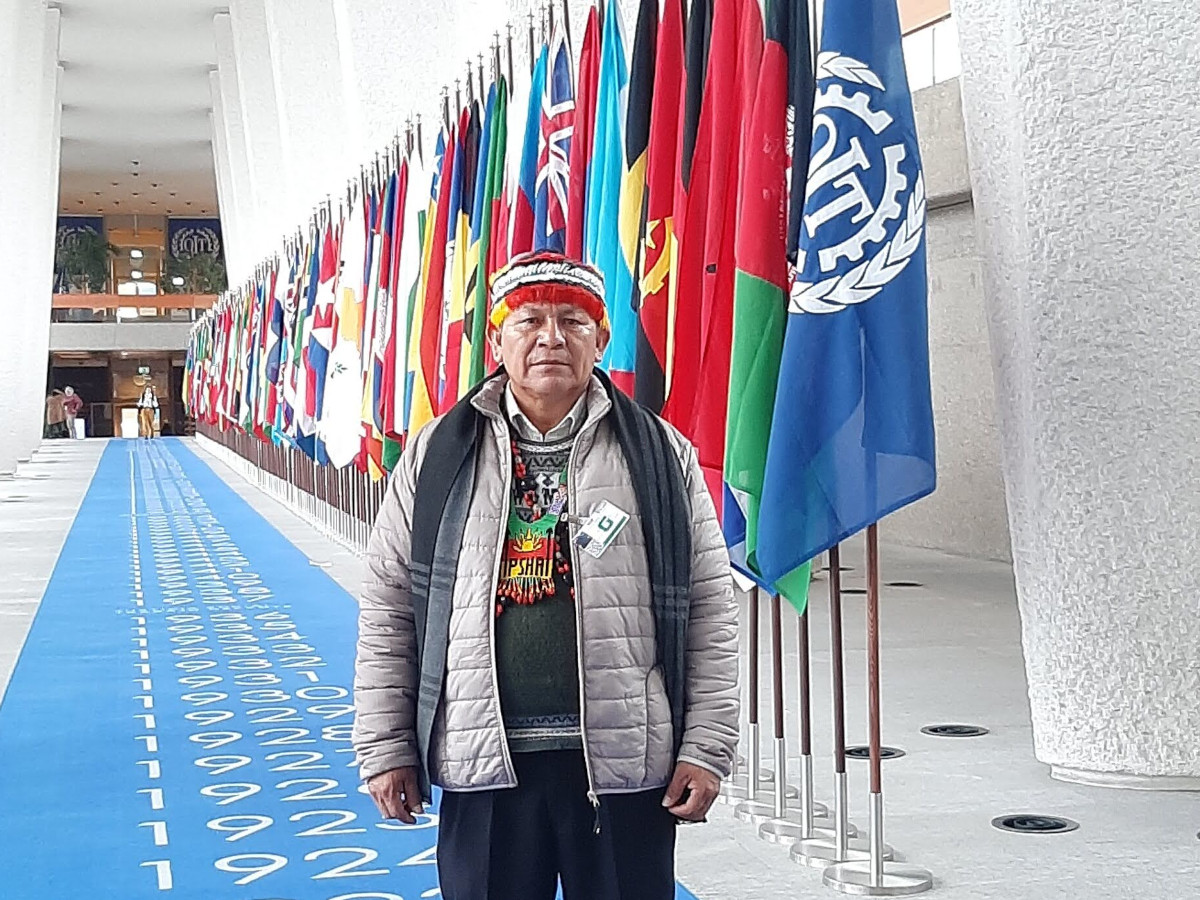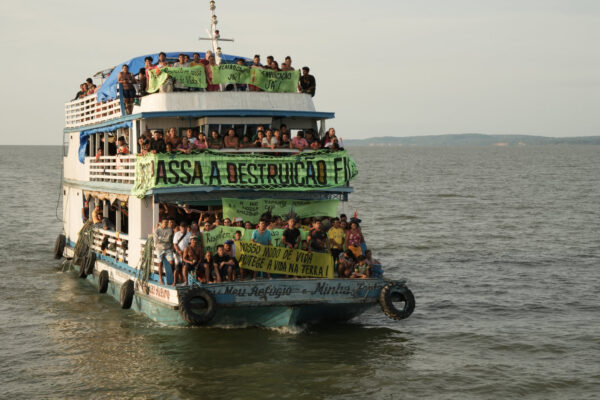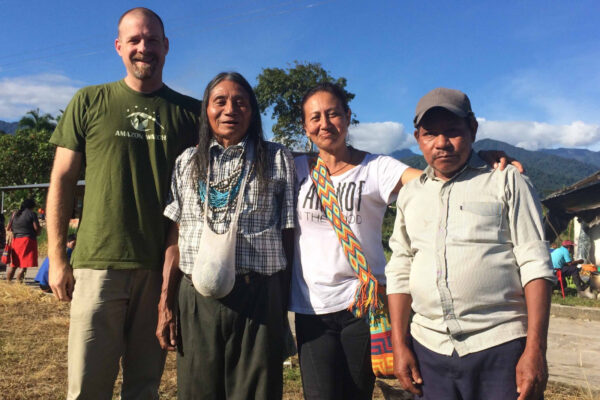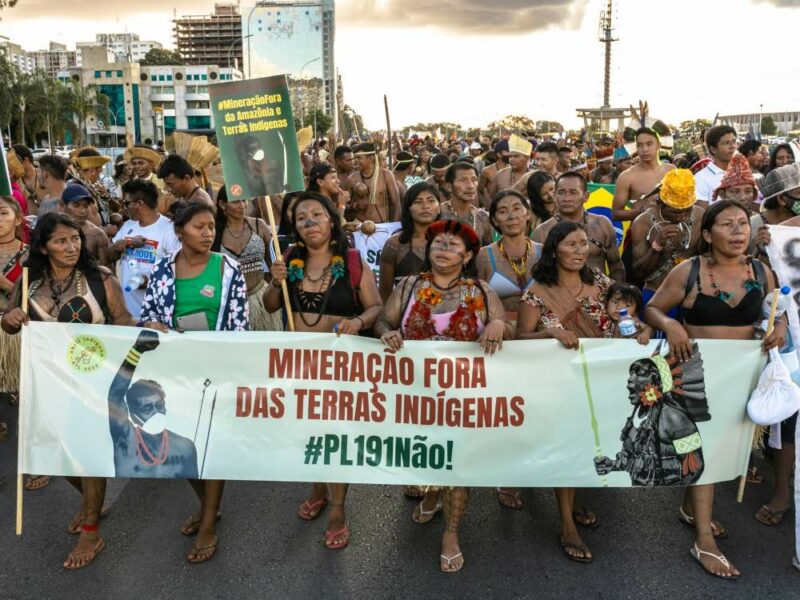More photos available here.
Geneva/Quito – In a major victory for the Shuar Arutam Indigenous people (Pueblo Shuar Arutam – PSHA) in Ecuador’s Amazon, the International Labor Organization (ILO) concluded today that they had not been consulted over two copper mining projects on their territory: the Warintza mine operated by Canadian company Solaris Resources Inc., and Panantza-San Carlos, operated by ExplorCobres S.A., a subsidiary of the state-owned Chinese company CRCC-Tongguan Investment Co. The lack of consultation violates PSHA’s rights as guaranteed in the ILO Convention 169 and enshrined in Ecuador’s constitution. Today’s decision puts both projects in legal jeopardy and raises questions over their future viability.
The decision is the latest blow for Solaris Resources, whose flagship Warintza project faced a complaint from PSHA to the British Columbia Securities Commission (BCSC) regarding the lack of consultation and consent. Today’s conclusion from the ILO affirms PSHA’s arguments in the complaint, stating that they have never been consulted. This contradicts Solaris’ public claims that it had “constantly consulted” local communities and has a social license to operate. Solaris misrepresented or omitted material facts on the lack of consultation and consent in disclosures to the BCSC, misleading investors at the annual Prospectors and Developers Association of Canada (PDAC) conference in Toronto earlier this month. Additionally, Solaris was forced to rectify various misleading technical claims about the project in its disclosures last week.
In January 2021, the Public Services International, a Global Union Federation representing more than 300 million workers in 154 countries through over 700 trade unions, along with its Ecuadorian counterparts, filed a complaint on behalf of PSHA. This was in response to the ongoing violations of the collective rights of PSHA established in Convention 169 of the ILO. The complaint received support from attorney Mario Melo, Amazon Watch, and other organizations.
The Shuar Arutam, representing 47 communities spread across 230,000 hectares, have consistently rejected mining activities on their collective territory. They filed the complaint after Solaris attempted to divide communities, and manufacture a “strategic alliance” among members of two out of the 47 communities. Additionally, PSHA took legal action before Ecuador’s constitutional court against the Panantza-San Carlos project over the lack of consultation. The court ruled in favor of PSHA and revoked the project’s environmental license. The ILO’s conclusions make clear that PSHA is the Indigenous organization that should be consulted regarding these projects, emphasizing that consultation has not yet taken place.
The ILO concluded that any agreements Solaris may have reached with certain individuals and their communities do not equate to complying with Free, Prior, and Informed Consultation as guaranteed in the 169 convention. This consultation is an obligation of the government, not private companies.
According to the ILO conclusion:
“Regarding the allegations of the confirmation of a “strategic alliance” between the company that holds the concessions and some members of some communities affected with the goal of reactivating the project, the Committee considers that, while it doesn’t prohibit a relationship between companies in the private sector with Indigenous peoples in the context of a project slated for development in their territories, this relationship is not equivalent to a process of consultation in the sense of the Convention, which, as previously mentioned, corresponds to the responsibility of the state and is subject to the requirements outlined in article 6 of the agreement.”
The conclusion of the ILO claim comes at a crucial political moment for the defense of Indigenous territorial rights, given Ecuador President Daniel Noboa’s announcement of the opening of the mining cadastre – a move that would redraw or create new mining concessions for auction. The ILO warned the government that it must reinforce efforts to adopt a regulatory framework that defines the scope and procedure of consultation, particularly in the mining sector. However, this process must be done in consultation with indigenous peoples, undermining the government’s new “mining manual” announced this month to guide community consultations. This manual was created without consulting indigenous peoples.
Ecuador is aiming to establish itself as a prominent mining destination globally, especially in the pursuit of critical minerals for transitioning away from fossil fuels. However, Indigenous organizations are increasingly opposing this sector due to rights violations and environmental impacts of mining, particularly in the Amazon, which is at a critical ecological tipping point.
“Today’s decision affirms what we’ve been saying all along. We have not been consulted. We have not provided our consent. Our land is not for sale. We will defend our territory, our forests, our rivers, and our culture. The ILO committee recognized that the Warintza mining project affects several communities, that no consultation has taken place, and that PSHA is the Indigenous institution responsible for providing or withholding consent. We hope the ILO conclusions show the government, companies, and investors that they can’t disrespect our organization and our decisions.”
Jaime Palomino, President of PSHA
“Today’s resolutions of the ILO have major implications for the country’s mining sector. It sets a new precedent for the industry not only because it recognizes the systematic violations to which the Shuar Arutam People have been subjected, but because it shows that the typical strategies used by companies to divide communities and obtain consent are invalid. It affirms that the government has the obligation to formulate and construct mining policies in consultation with Indigenous peoples, which renders the recent ‘mining manual’ moot because it was created without consultation.”
Sofia Jarrin, International Advocacy Advisor, Amazon Watch
“The ILO Committee agreed with the PSHA that the San Carlos Panantza and Warintza projects were not subjected to processes of Free, Prior, and Informed Consultation with the affected communities. This is an important victory for the Shuar Arutam People who are fighting for their rights to be respected by mining companies operating in their territory without complying with the provisions of ILO Convention 169.”
Mario Melo, attorney for PSHA in ILO claim














